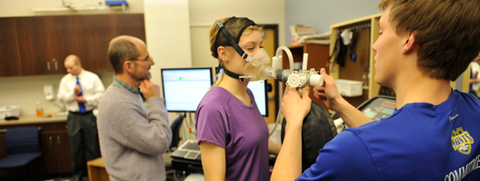Breadcrumbs
Undergraduate Physiology

What is Physiology?
Physiology is the study of living matter in action, i.e., the study of organ system function by physical or chemical means.
It is an integrating discipline dealing with controls, compensations and interrelationships. Interaction with the environment is always a major factor.
Physiology serves as a bridge between cellular biology and control theory and systems analysis. In this respect it resembles Engineering, with which it shares a foundation in physics and chemistry.
What Can Physiologists Do?
Physiology provides a necessary background preparation for graduate work in Physiology and related areas; for the study of Pharmacology; for the teaching of Biological Science in secondary schools; or for subsequent training in Medicine, Dentistry, Pharmacy, Nursing, and the Health Sciences in general.
Physiologists are needed in hospitals and schools of medicine as teachers and research personnel, as well as in research institutes and government laboratories. Other outlets include agriculture and veterinary schools, in military research establishments and in pharmaceutical industries. The development of air and space travel, the exploration of the continental shelf, the development of northern regions, an increased emphasis on exercise and fitness, all provide problems and research opportunities for the person trained in Physiology.
Programs
- Physiology Minor Program
- Physiology Major Program
- Physiology Specialist Program
- Biophysics Specialist Program
Research
Physiology research covers a variety of specialties, each with very different technical and analytical methods. There are eight major areas:
- Cardiovascular & Renal
- Membrane Physiology
- Metabolism
- Regulatory Peptides
- Reproduction/Development
- Respiratory Physiology
- Sensory-Motor Physiology
- Theoretical Physiology
Advice for Prospective Students
Enthusiastic students may be fortunate enough to master elementary physiology with little or no background in the natural sciences (CHM, MAT, PHY) — the function of the human body being a topic that frequently motivates interest. Success at the more advanced levels of physiological study, however, is strongly dependent on a good background in both natural sciences and life sciences. This is particularly true of research. We therefore urge undergraduate students to supplement their PSL program with appropriate courses from CHM/CSC/MAT/PHY.
Note: The PSL (or JBO) 302Y lecture course is required or given credit in the following programs: BIO, Biophysics, Comparative Animal Physiology, Human BIO, Genes, Genetics & Biotechnology, Health and Disease, Human Behavioral Biology, Life Science, NFS, Pathobiology, PCL, PSL, PSL, TOX.
Students with appropriate interests will find that PSL300H and PSL301H is a suitable supplement to programs in CHM/MAT/PHY/PSY/STA/ZOO, even though PSL is not required in these programs. Such students will find it useful to have taken PSL300H and PSL301H should they later wish to switch to graduate studies in PSL.
Advice for First-Year Students
Students who are interested in studying physiology should take:
- BIO 120H1 - Adaptation and Biodiversity and BIO130H1 - Molecular and Cell Biology
- CHM138H - Introductory Organic Chemistry 1 and CHM 139H1 - Chemistry: Physical Principles
- An introductory calculus course
- A physics course
Careers
The development of air and space travel, and of the northern regions, an increased emphasis on exercise and fitness, and the advent of "artificial intelligence" based upon nervous system principles, all provide exciting problems and research opportunities for those trained in physiology.
Students often continue their studies at the graduate level (MSc or PhD), a requirement for research and teaching at universities and colleges.
Direct career options include:
- Cardiovascular tech
- Geneticist assistant
- Health care administrator
- Home care worker
- Lab assistant
- Practical nursing
- Medical laboratory technician
- Personal trainer
- Therapist assistant
- Physiologist
- Research assistant
- Science technical writer
Physiology for Interest Only
PSL201Y1: This course is intended to be a terminal course. A PSL 201Y credit does not count towards the PSL Specialist Programs, and excludes enrolment in (PSL300H1, PSL301H1)/PSL302Y1. Students who wish to subsequently enroll in 400 level PSL courses should take (PSL300H1, PSL301H1)/ PSL 302Y1, NOT PSL201Y1.